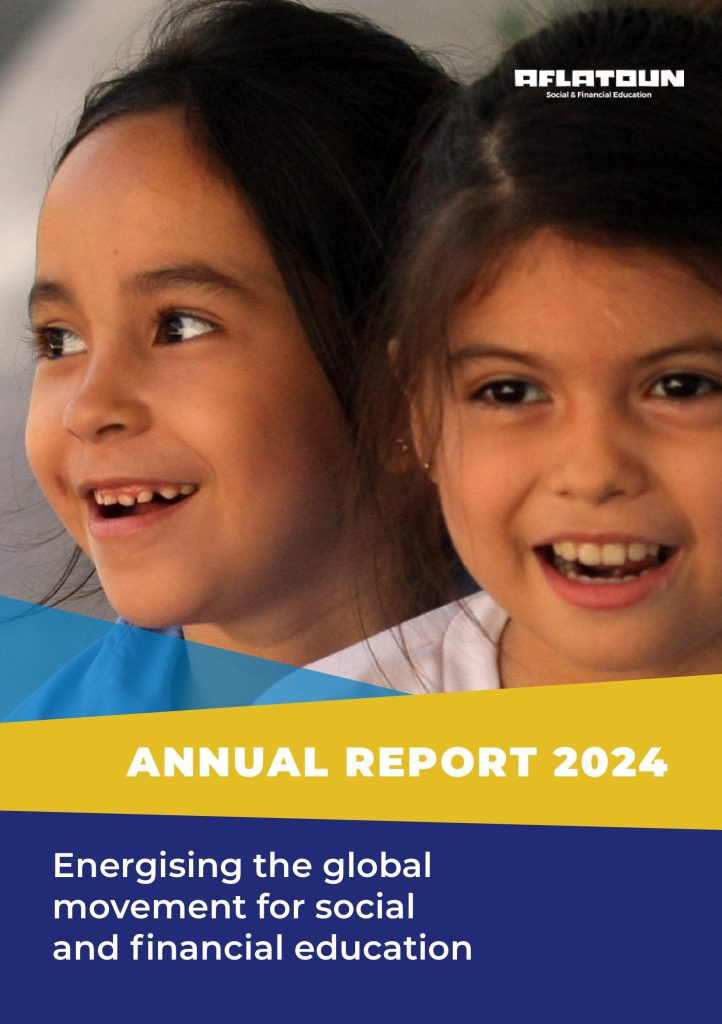As we kick off Global Money Week, which should be a moment of celebrations, children from all over the world are expressing their concerns about the ongoing COVID-19 pandemic and the impact it has on them, as well as their families, friends and communities.
During the past week, Aflatoun International connected children from 40 countries around the world to share and discuss among themselves current challenges and identify solutions looking forward. There are three recurring themes. The children are calling for the re-opening of schools and, if this is not possible, for providing real working solutions for distance learning. Secondly, they are asking for help to reduce their anxiety as they cannot access their usual support from their friends and peers (mental health). And thirdly, they are concerned about the socio-economic situation of their parents and caregivers which can again impact their own future further; if the financial situation at home does not allow them to access quality and relevant education that will let them develop the skills needed to successfully transition from childhood to adulthood – #ChildrenEmpowered.
Full Statement
Today, we kick off the celebrations of Global Money Week (GMW), an annual global celebration with global, regional and local and activities aimed at inspiring children and youth to learn about money, saving, creating livelihoods, gaining employment or becoming entrepreneurs. GMW takes its roots from Aflatoun Day, an annual celebration and learning event organised every year in March. ‘Take care of yourself, take care of your money’ is the official theme of GMW 2021. This theme highlights the importance of building financial resilience and staying healthy in the current context of the global pandemic.
In the run-up to Aflatoun Day 2021 (25 March 2021), Aflatoun and its partners organised a series of calls with and between children and young people from more than 40 countries in Africa, Asia, Europe, the Middle East and the Americas. The youth openly spoke about how the COVID-19 pandemic affected their lives and shared their coping mechanisms. They are asking their governments and policymakers for practical solutions to reduce their anxiety and allow them to continue their education immediately.
Children are losing a sense of future
Children are not happy. Every girl and boy participating in the discussions, from Colombia to Ghana, to the Philippines, felt the consequences of the pandemic in their daily life. They all miss their friends and find that the most difficult part is not being able to go to school. Switching to online learning has not been easy: many households do not have access to the internet, and many do not have devices to access online learning materials.
“When the schools closed, we started studying at home. But some classes are difficult to study alone. I am sad that we missed many opportunities to learn and socialise with our friends. I have not seen my friends for months.” – Ishara from Sri Lanka.
“One of the greatest challenges for me was the schools’ closure. Many young people in El Salvador do not have digital means to continue virtual education. In my case, my family cannot afford to have digital materials that would allow me to study online. Gladly, thanks to the Foundation [Fundación Gloria de Kriete] and other people who helped me I could continue learning. In Salvador, there are many children who do not have resources to study online.” – Leslie from El Salvador.
Children from the Philippines mentioned a slow internet connection. Showing that simply having access to learning devices is not enough; in order to ensure quality online learning, internet access must also be ensured.
Additionally, the pandemic took its toll on children’s mental health. Even though almost every young person mentioned that the lockdown was a great time to connect with their families, it majorly affected their mental well-being.
“The confinement was very difficult for me. The restraints from not being able to do the activities that make me happy, honestly, had serious effects on my mental health. Everything stopped. We were forced to stay at home, we had very little to do, and on top of that, we had absolutely no assurances or hope in our future. This was in addition to all the general health-related stresses of the pandemic. It was very stressful for us young people.” – Gabriele from Burkina Faso.
“The pandemic has been very hard. We could not do many things together with our friends. For example, we could not see them, play with them or be around them, so it is hard to live a normal life.” – Harawobadi from Ghana.












